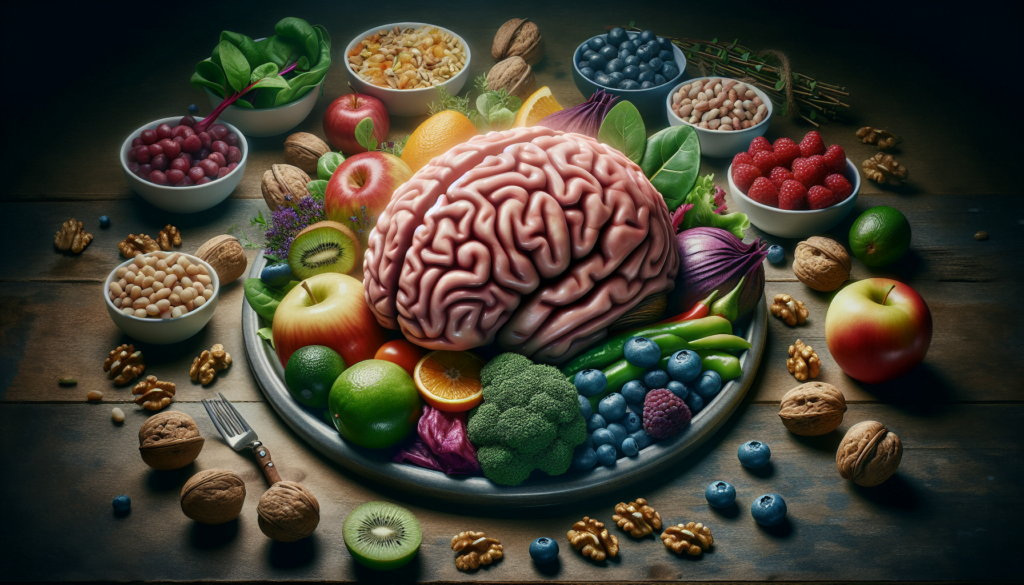Proper nutrition is the cornerstone of overall health, and this is particularly true when it comes to the health of the brain. The intricate connection between the food we consume and our cognitive function is an area of increasing interest and importance. Understanding this relationship can be the key to maintaining a sharp mind and emotional well-being throughout life.
Key Takeaways
- Nutritional psychiatry is an emerging field that links diet to brain health and emotional well-being.
- Certain nutrients play a critical role in cognitive function and mood regulation.
- Diets like the Mediterranean and MIND diets have been shown to benefit brain health.
- The gut-brain axis suggests that gut health significantly impacts mental health.
- Early childhood nutrition is crucial for brain development and can have long-term effects.
- Lifestyle factors, including exercise and weight management, influence cognitive function.
Introduction to Nutritional Psychiatry and Brain Health
Definition of Nutritional Psychiatry
Nutritional psychiatry is a burgeoning field that explores the impact of dietary habits on mental health. It posits that the brain, like any other organ, requires a range of nutrients to function optimally.
Overview of Brain Function and Mood
The brain is a complex organ responsible for controlling thought, memory, emotion, touch, motor skills, vision, breathing, temperature, hunger, and every process that regulates our body. Mood and cognitive functions are deeply intertwined with the brain’s biochemical environment.
The Direct Impact of Diet on Brain Health
What we eat directly affects the structure and function of our brain and, ultimately, our mood. Like an expensive car, the brain functions best when it gets only premium fuel, meaning nourishing, antioxidant-rich foods.
!

The Relationship Between Diet and Mental Health
How Food Choices Affect Mental Well-being
Food choices can lead to an increased risk of psychiatric disorders. Diets high in refined sugars, for example, are harmful to the brain and may worsen mood disorders, such as depression.
The Role of Nutrients in Cognitive Function
Nutrients such as omega-3 fatty acids, antioxidants, vitamins, and minerals provide the brain with the tools it needs to manage stress, regulate mood, and repair damage.
Diet as a Factor in Mental Health Disorders
Poor diet is a risk factor for several mental health disorders. Nutritional deficiencies in certain vitamins or minerals can result in cognitive decline and mental health issues.
!

Practical Applications of Nutritional Psychiatry
Daily Dietary Recommendations for Brain Health
A balanced diet rich in fruits, vegetables, lean protein, and whole grains is recommended for brain health. This diet should include foods high in omega-3 fatty acids, such as salmon and flaxseeds.
Incorporating Brain-Healthy Foods into Meals
Incorporating brain-healthy foods into daily meals can be simple and delicious. For example, adding berries to breakfast or snacking on nuts can boost intake of essential nutrients.
Lifestyle Changes to Support Nutritional Psychiatry
Lifestyle changes, such as regular physical activity and mindful eating, can enhance the benefits of a brain-healthy diet. Mindful eating as a form of self-care is an approach that encourages being present and making conscious food choices.
!

Brain-Boosting Diets: Mediterranean and MIND
Understanding the Mediterranean Diet
The Mediterranean diet emphasizes eating primarily plant-based foods, such as fruits and vegetables, whole grains, legumes, and nuts.
Key Components
Key components of the Mediterranean diet include replacing butter with healthy fats such as olive oil and using herbs and spices instead of salt to flavor foods.
Benefits for Brain Health
Studies have shown that the traditional Mediterranean diet reduces the risk of heart disease, and there’s also evidence that it may have a positive effect on brain health, potentially reducing the risk of Alzheimer’s disease. What do we know about diet and prevention of Alzheimer’s disease?
Insights into the MIND Diet
The MIND diet is a hybrid of the Mediterranean and DASH diets that focuses on foods specifically beneficial for brain health.
Diet Structure
The MIND diet encourages the consumption of green leafy vegetables, berries, nuts, beans, whole grains, fish, poultry, olive oil, and wine in moderation.
Cognitive Benefits and Disease Prevention
Following the MIND diet, even moderately, is associated with a reduced risk of Alzheimer’s disease and slower cognitive decline.
!

The Gut-Brain Connection
Exploring the Gut-Brain Axis
The gut-brain axis is a two-way communication system between the central nervous system and the enteric nervous system, linking emotional and cognitive centers of the brain with peripheral intestinal functions.
The Influence of Gut Health on Mental Health
Emerging research suggests that gut health significantly impacts mental health. An imbalance in the gut microbiota may lead to an increased risk of developing neuropsychiatric disorders.
Probiotics and Brain Function
Probiotics, beneficial bacteria found in certain yogurts and supplements, can improve gut health, which in turn may benefit brain function.
!

The Impact of Individual Foods on Brain Health
Foods Known to Enhance Cognitive Function
Foods like blueberries, turmeric, broccoli, pumpkin seeds, and dark chocolate are known to enhance cognitive function and protect against brain diseases.
Foods to Avoid for Optimal Brain Health
To maintain optimal brain health, it is advisable to avoid excessive amounts of alcohol, foods high in sugar and fat, and processed foods.
Balancing Macronutrients for Brain Health
A diet that balances macronutrients—carbohydrates, proteins, and fats—can support brain health and improve mood and cognitive function.
!
Vitamins and Supplements for Brain Health
Essential Vitamins for Cognitive Function
Vitamins such as B-complex, vitamin D, and antioxidants like vitamin E play a significant role in cognitive function and are essential for brain health.
The Role of Omega-3 Fatty Acids
Omega-3 fatty acids are crucial for brain function and development. They can be found in fish oil supplements and in fatty fish like salmon and trout.
Herbal Supplements and Brain Health
Herbal supplements such as ginkgo biloba and ginseng may have positive effects on brain health, although more research is needed to fully understand their benefits.
!

The Role of Early Childhood Nutrition in Brain Development
The Importance of Early Childhood Experiences
Early childhood experiences, including nutrition, play a significant role in brain development. Proper nutrition during this critical period is essential for cognitive development and can have lasting effects.
Nutritional Requirements for Developing Brains
Developing brains require specific nutrients, such as iron, iodine, and choline, to develop properly. Deficiencies in these nutrients can lead to cognitive impairments.
Long-term Effects of Early Nutrition on Brain Health
The long-term effects of early nutrition on brain health are profound. Adequate nutrition can support cognitive function well into adulthood. Early brain development is crucial for setting the foundation for lifelong health and well-being.
Lifestyle Factors Influencing Brain Health
Weight Management and Cognitive Function
Maintaining a healthy weight can positively affect cognitive function and reduce the risk of cognitive decline.
Exercise and Its Immediate Cognitive Benefits
Regular physical activity has immediate benefits for cognitive function, including improved concentration and attention. Physical activity and brain health are closely linked.
Managing Chronic Health Conditions to Support Brain Health
Managing chronic health conditions, such as diabetes and hypertension, is important for maintaining brain health and preventing cognitive decline.
Strategies for Enhancing Brain Health
Recommendations for a Brain-Healthy Lifestyle
A brain-healthy lifestyle includes a balanced diet, regular exercise, mental stimulation, quality sleep, and stress management.
Preventative Measures for Cognitive Decline
Preventative measures for cognitive decline include staying socially active, engaging in regular physical activity, and following a brain-healthy diet.
Public Health Initiatives and Support for Brain Health
Public health initiatives play a crucial role in supporting brain health across populations. These initiatives can provide resources and education on maintaining cognitive function and preventing mental decline.
In conclusion, proper nutrition is vital for maintaining brain health and overall well-being. By understanding the principles of nutritional psychiatry and making informed dietary choices, individuals can support their mental health and cognitive function throughout their lives. Incorporating brain-healthy foods, managing lifestyle factors, and understanding the role of early childhood nutrition can all contribute to a sharper mind and a happier life.
Nourish Your Mind: Unveiling the Mysteries of Brain Health Through Our Nutrition FAQ
Why is nutrition important for brain health?
Nutrition plays a pivotal role in brain health because the brain relies on a steady supply of nutrients to function optimally. Essential fatty acids, amino acids, glucose, vitamins, and minerals are all crucial for cognitive processes, including memory, concentration, and problem-solving. A well-balanced diet can support brain development, prevent cognitive decline, and may reduce the risk of brain-related diseases.
What are the best foods to eat for brain health?
Foods rich in omega-3 fatty acids like salmon, flaxseeds, and walnuts; antioxidants found in berries and leafy greens; whole grains for a steady supply of glucose; and lean proteins for amino acids are excellent for brain health. Additionally, foods high in vitamins E, C, and B, as well as minerals like iron and magnesium, support brain function.
Can nutrition affect mood and mental health?
Yes, nutrition can significantly affect mood and mental health. Diets high in refined sugars and unhealthy fats can exacerbate symptoms of depression and anxiety. Conversely, a diet rich in vitamins, minerals, and antioxidants can improve mood and reduce the risk of mental health issues.
How does hydration impact brain function?
Hydration is essential for brain function as the brain is about 75% water. Even mild dehydration can impair cognitive abilities, concentration, and memory. It’s recommended to drink plenty of water throughout the day to maintain optimal brain performance.
Are there specific dietary patterns that promote brain health?
The Mediterranean diet and the MIND diet (a combination of the Mediterranean and DASH diets) are particularly noted for promoting brain health. They emphasize whole grains, fruits, vegetables, fish, nuts, and olive oil, and have been associated with a lower risk of cognitive decline and dementia.
Can certain foods or nutrients improve memory?
Certain foods and nutrients have been linked to better memory function. These include omega-3 fatty acids, flavonoids in berries, caffeine in moderation, and foods rich in vitamin E and B vitamins. Regular consumption of these can contribute to improved memory and cognitive function.
Is there a connection between gut health and brain health?
Emerging research suggests a strong connection between gut health and brain health, often referred to as the gut-brain axis. A healthy gut microbiome can influence the production of neurotransmitters, reduce inflammation, and impact stress response, all of which can affect cognitive function and mental health.
How does sugar consumption affect the brain?
Excessive sugar consumption can lead to a range of negative effects on the brain, including inflammation, oxidative stress, and an increased risk of disorders such as depression and dementia. It can also impair cognitive functions and lead to a cycle of cravings and blood sugar spikes that affect mood and energy levels.
Are there any supplements that are beneficial for brain health?
While a balanced diet is the best way to get necessary nutrients, some supplements may benefit brain health, such as omega-3 fatty acids, B vitamins, vitamin D, and probiotics. However, it’s important to consult with a healthcare provider before starting any supplement regimen.
Can a poor diet have long-term effects on brain health?
A poor diet can have profound long-term effects on brain health. Chronic consumption of a diet high in saturated fats, sugars, and processed foods can lead to cognitive decline, reduced brain plasticity, and an increased risk of neurodegenerative diseases like Alzheimer’s. Adopting healthy eating habits early on can help mitigate these risks.



